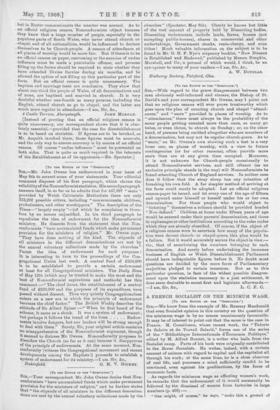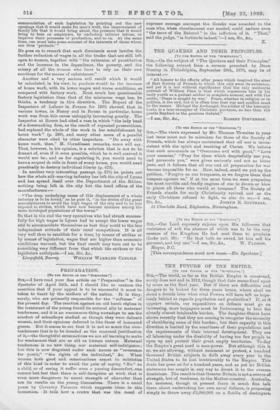A FRENCH SOCIALIST ON THE MINIMUM WAGE.
[TO THI EDITOR OF THU " SPZOTATO R."
Snt,—We know from the example of Mr. Ramsay Macdonald that even Socialist opinion in this country on the question of the minimum wage is by no means unanimously favourable. It may be of interest to point out that the same is the case in France. M. Cornelissen, whose recent work, the " Theorie du Salaire et du Travail Salarie," forms one Of the series of the " Bibliothbque Internationale d'Econotnie Politique," edited by M. Alfred Bonnet, is a writer who hails from the Socialist camp. Parts of his book were originally contributed to the _Revue Socialiste. He writes, indeed, with a certain amount of animus with regard to capital and the capitalist all through his Work; at the same time, he is a close observer of real life, and possesses a mind sufficiently candid to be convinced, even against his predilections, by the force of economic facts.
As regards the minimum wage as affecting women's work, he remarks that the enforcement of it would necessarily be followed by the dismissal of women from factories in large numbers (p. 468) :— "One might, of course," he says, "make this a ground of commendation of such legislation by pointing out the new openings that it would make for men's work, the improvement of family life that it would bring about, the pressure that it would bring to bear on employers, by excluding inferior labour, to improve their processes of production, and so on. At the same time, one must take some account of the interests of those whom one thus 'protects."
He goes on to remark that such dismissals must involve the further reduction of wages in all the trades that are still left open to women, together with "the extension of prostitution and the increase in the dependence, the poverty, and the misery of all the women who have to rely on their own
exertions for the means of subsistence."
Another and a very serious evil result which it would be calculated, in his view, to produce would he the increase of home work, with its lower wages and worse conditions, as compared with factory work. Even much less questionable factory legislation than that of the minimum wage has, be thinks, a tendeney in this direction. The Report of the Inspectors of Labour in France for 1902 showed that in various towns, in Nancy and in Rouen in particular, home work was from this cause unhappily increasing greatly. The Inspector at Rouen had cited a ease in which "the lady head of a dressmaking firm, as the result of repeated prosecutions, had replaced the whole of the work in her establishment by home work" (p. 299), and many other cases of a parallel character were cited by other inspectors. "Do away with home work, then," M. Corneliseen remarks, some will say. That, however, in his opinion, is a solution that is not to be dreamt of, even if it were possible, which he is well assured it would not be ; and as for regulating it, you would need to have a sergent de villa in front of every house, you would need practically to destroy individual liberty (p. 478).
In another very interesting passage (p. 870) he points out how the whole silk-weaving industry has left the city of Lyons
and has spread itself over the Department of the Memo, nothing being left in the city but the head offices of the manufacturers:— , "The deep underlying cause of this displacement of a whole industry is to be found," HS he puts it, "in the desire of the great manufacturers to avoid the high wages of the city and to bo less exposed to strikes, which have now become common among the more developed populations of the towns."
So that in the end the very operatives who had struck success- fully for high wages in Lyons had to accept the lower wages and to accommodate themselves as best they could to the less independent attitude of their rural competitors. It is all very well thus to establish for a time, by means of strikes or by means of legislation, wages that are higher than economic Conditions warrant, but the final result may turn out to be iomething very different from that which the strikers or the legislators anticipate.—I am, Sir, &a., ' Limpsfield, Surrey. WILLIAM WAURAND CAULILE.











































 Previous page
Previous page